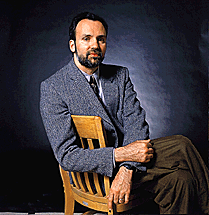

Yes--and no, says Classics Professor James Clauss. "Rome was multicultural from the beginning," he declares. The Roman Empire eventually spread to Spain, North Africa and the Middle East, and members of conquered ethnic groups gradually rose to power. It was an empire, and is a history, that has been over-characterized in modern times as "For Whites Only."
Clauss' enthusiasm for the classics, his ability to make them relevant today and his interest in his students have earned him a 1996 Distinguished Teaching Award. He has taught a wide range of courses offered in the classics department, but the courses that have brought him the most acclaim have been the two he teaches in conjunction with the Office of Minority Affairs. In one he uses Latin to teach English grammar to students in the Educational Opportunity Program; in the second he takes students to Rome for an 10-day course in ancient Roman history.
A colleague describes Clauss' grammar class as "one of his most remarkable innovations."
"Latin helps students identify parts of speech and understand their relationship to one another," Clauss says. "There is a rigor and discipline involved in its study that has great value.
"By and large, minority students bring a different perspective to the classroom and community, and because of that, they can make an important contribution to the UW in particular and American society in general," he says. "If they can articulate their ideas clearly and with eloquence, people will listen. My goal in Classics 102 is to show students the way toward gaining a solid command of the English language, a skill that will give them the power to be heard."
The second course, an intensive five-credit, upper-division class in Rome, gives Clauss the chance to debunk the myth that Western civilization is only a story of dead white males.
"The students learn how much Roman culture has influenced their own lives--the architecture they see every day; the legal system they live in. They quickly come to realize that they are a part of this very long tradition. They may not like it, but they are a part of it," Clauss explains.
The Rome study group can include African American, Hispanic, Asian, Native American and white students who may be anxious about traveling and living with students of other ethnic backgrounds. The experience of being foreigners in a foreign land helps them see their commonalty. "They are all in the same boat; they are Americans in Italy," he says.
The class is not just a trip to Rome over spring break. There are several meetings before the trip, afternoon classes coupled with walking excursions through the city, weekly classes after returning to Seattle, oral reports, a research paper and a joint project.
"It would be great to be able to walk through all of my courses like we walked through Rome," says one student. "It is so much easier to live what you learn."
Clauss recently has written an experimental textbook for his English grammar through Latin course--a concept that is being picked up by other universities around the nation--entitled Terminal Latin. The book's name mirrors the course's philosophy: The aim is not to make a classicist of every student, but to teach them enough so they are no longer "linguistic couch potatoes" and have a greater appreciation for Western civilization and their essential part in it.--Nedra Pautler, UW Office of News and Information
Send a letter to the editor at columns@u.washington.edu.
Return to Best of 1996 Home Page